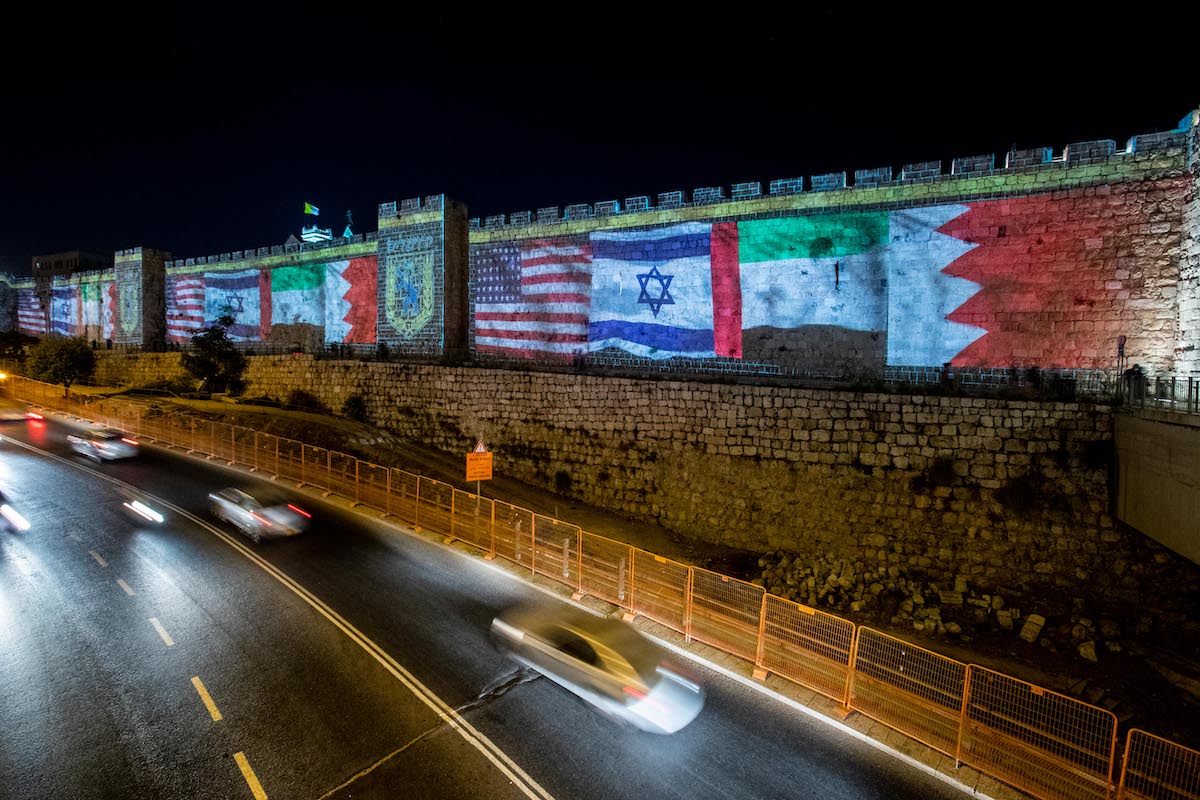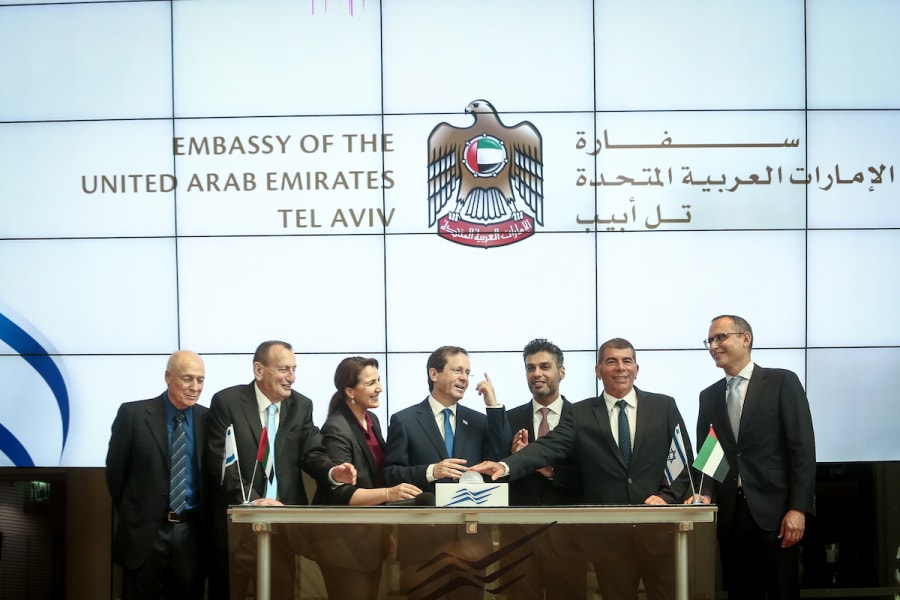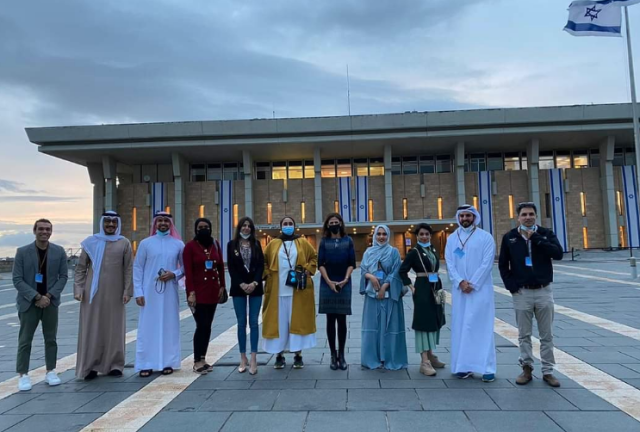Abraham Accords 4 years later: 2020 vision
How has the conflict between Israel and Iran's terror proxies affected the accords?

Just in case we've become accustomed to the extraordinary fact that four Arab states now have warm ties with Israel, let’s look back on the last four years since Sept. 15, 2020.
The historic signing of the Abraham Accords in 2020 was revolutionary, even inconceivable. Former U.S. Secretary of State John Kerry had previously dismissed such a deal as “impossible.”
How are the peace accords holding up today, and do they have any impact on the embittered fighting between Israel and Iranian proxies in the Middle East? Is Saudi Arabia still interested in normalizing ties, and what might happen next?
ALL ISRAEL NEWS Editor-in-Chief Joel Rosenberg has been deeply invested and personally present at many significant meetings long before the Accords were signed. Rosenberg first met Sheikh Abdullah bin Zayed Al Nahyan (ABZ), UAE minister of Foreign Affairs and International Cooperation, in Manhattan back in 2018. They discussed and finalized details to bring a delegation of Evangelical leaders to Abu Dhabi the following month.
When the delegation arrived in the Emirati capital they met ABZ, as well as his older brother, Crown Prince Sheikh Mohamed bin Zayed Al Nahyan (MBZ).
“At that time, [MBZ] confided to our group that he had decided it was in the UAE’s profound national interests to make peace with Israel and not only accept the Jewish people’s right to live in safety and security in their ancient homeland, but to build a true, enduring and warm friendship and alliance with the Jewish state. We were stunned and encouraged,” Rosenberg recounted. “We were even more encouraged when, less than two years later, MBZ kept his word and announced the historic Abraham Accords.”
Israeli Prime Minister Benjamin Netanyahu, Emirati Foreign Minister Abdullah bin Zayed Al Nahyan, and Bahraini Foreign Minister Abdullatif bin Rashid Al Zayani met together to sign this declaration facilitated by then-U.S. President Donald Trump at the White House event. Morocco and Sudan later followed suit, establishing diplomatic ties with the State of Israel. It’s worth revisiting the words chosen for the world-changing declaration.
The Abraham Accords Declaration
We, the undersigned, recognize the importance of maintaining and strengthening peace in the Middle East and around the world based on mutual understanding and coexistence, as well as respect for human dignity and freedom, including religious freedom.
We encourage efforts to promote interfaith and intercultural dialogue to advance a culture of peace among the three Abrahamic religions and all humanity.
We believe that the best way to address challenges is through cooperation and dialogue and that developing friendly relations among States advances the interests of lasting peace in the Middle East and around the world.
We seek tolerance and respect for every person in order to make this world a place where all can enjoy a life of dignity and hope, no matter their race, faith or ethnicity.
We support science, art, medicine, and commerce to inspire humankind, maximize human potential and bring nations closer together.
We seek to end radicalization and conflict to provide all children a better future.
We pursue a vision of peace, security, and prosperity in the Middle East and around the world.
In this spirit, we warmly welcome and are encouraged by the progress already made in establishing diplomatic relations between Israel and its neighbors in the region under the principles of the Abraham Accords. We are encouraged by the ongoing effort to consolidate and expand such friendly relations based on shared interests and a shared commitment to a better future.

The Abraham Accords not only speak about trade and cooperation but, crucially, religious freedom in the Middle East, and the results following the peace accords have been profound.
The success story so far
Even five years ago, if people were told they would soon see flight paths between Tel Aviv and Abu Dhabi, Dubai, Manama, Casablanca and Marrakesh, most would have struggled to believe it. Yet, there have been breakthroughs in cooperation with travel and also great strides forward in fostering friendships between previously hostile nations through sports, cultural programs, and official visits. On the regional security level, there have been intelligence-sharing cooperation, joint training exercises, and industrial collaboration.
There is a coordinated and determined effort to counter the threat of Iranian-supported terrorism in the region. Trade routes in the Red Sea are plagued by hostile ships and Iranian proxies such as Hamas, Hezbollah in Lebanon and the Houthis from Yemen, who are fomenting violence and havoc. As noted by at least one Iranian leader, Israel is considered a "one bomb country" and cannot afford to take risks with the Iranian regime, which has openly called for its destruction.

Thanks to the Abraham Accords, we have seen significant steps to resist the Iranian threat, seen most recently when both Saudi Arabia and Jordan helped to shoot down Iranian missiles in an attack last April. We’ve seen statesmen from Arab states speaking up on behalf of Israel, and multiple indications that the Saudi Kingdom has not been dissuaded from its intention to join the Accords. Moreover, others have joined interest with several African countries, such as Sierra Leone in also wanting to establish peace with Israel. The Abraham Accords appear to be unshaken by Oct. 7 and here to stay.
Israel has now established diplomatic missions in the capitals of each of its Abraham Accords’ partners. The UAE has an embassy in Tel Aviv, and Morocco has an embassy in Jerusalem. Government officials and delegations have held reciprocal visits and signed follow-up agreements in the fields of trade, tourism, industry, technology, agriculture, science, technology and others.

In addition, there have been pivotal exchange programs such as the “The Leaders of Tomorrow” initiative, pioneered by ISRAEL-is. After a delegation of Israelis visited Marrakesh, a group of Moroccans visited a Druze village in Israel and heard firsthand how the Druze community has integrated into Israeli society. They spoke with Arab residents of the Old City of Jerusalem and visited the city’s four quarters.
They spent a Shabbat in Jerusalem and toured Yad Vashem, Israel’s Holocaust Memorial Museum. In the Hall of Names, members of the Moroccan delegation spontaneously recited an Arabic prayer in memory of the victims – an emotional event that, according to ISRAEL-is, brought all the participants and guides to tears.
“We are proud to take part in a program that connects young people from Israel and Morocco,” Abdou Ladino, general secretary of the Mimouna Association of Morocco told Israeli President Isaac Herzog. “We want to create a new era of peace and hope between our peoples. We came here, to Jerusalem, to continue the journey together.”

Trade has been booming as a result of the new alliance, an aspect of the accords that is holding great appeal for those contemplating normalization with Israel. Former White House Advisor to Trump Jared Kushner told The Wall Street Journal: “If we can get Israelis and Muslims in the region to do business together it will focus people on shared interests and shared values. We kicked off historic regional change which needs to be reinforced and nurtured to achieve its potential.” Even with the conflict raging in the Middle East, Kushner’s hopes have materialized.
Israel’s Central Bureau of Statistics (CBS) reported in 2022 that trade between Israel and UAE increased 130% and revealed a 94% increase with Morocco, but new records were broken in 2023, exceeding USD $4 billion, a 16% increase over the year. Bilateral trade expanded dramatically from $885 million in 2021 to $2.5 billion in 2022, and according to reports from the Abraham Accords Peace Institute, trade among the nations with Abraham Accords ties was up 24% in the first half of last year, estimating that the true value of such trade in 2023 exceeded USD $10 billion.
The report stated that even after the onset of war, the fourth quarter of 2023 only saw a 4% decrease in trade with the countries in the accords, while there was an 18% decrease in Israel’s overall trade. The latest Peace Institute report stated that “ties continued to deepen in 2023, which saw numerous high-level visits and delegations, the expansion of groundbreaking bilateral and multilateral frameworks, important interfaith developments, and unprecedented joint initiatives bringing together innovators, investors, experts, academics, and women leaders from across the region.”
We are witnessing previously unimaginable things happening. “There are two things I never thought I’d see in my lifetime,” Bahraini Industry, Commerce and Tourism Minister Zayed bin Rashid Al-Zayan told Rosenberg and his delegation in 2022: “Me visiting Israel, and women driving in Saudi Arabia.” His job was to design and implement Bahrain’s aggressive economic growth strategy and he sees the Abraham Accords as a critical cornerstone of that mission, with trade and tourism flourishing.

Will war break the Abraham Accords?
Today, the political turmoil in both the United States and Israel, along with the severe regional conflict, might appear to be a threat to progress, but four years later, it’s worth remembering that the Abraham Accords were signed under those very circumstances. There were changes in government, both in Jerusalem and Washington, as well as two rounds of intense fighting between Israel and Gaza. But the peace between the accords’ signatories still prevailed.
Still, the conflict is an important consideration for the future of the Abraham Accords. While other nations including Saudi Arabia, Mauritania, Indonesia, Somalia, Niger, and even Pakistan, have mooted interest in joining the accords, the question of security has become paramount for Israel.
In his meeting with then-Israeli Defense Minister Benny Gantz, Rosenberg saw that the apocalyptic Iranian regime – and its growing alliance with Russia, Turkey, North Korea and China – was seen as the No. 1 threat facing Israel for the foreseeable future.
“Gantz then showed me a map of the Middle East that he keeps on his desk. On it he has drawn a thick black line dividing the region into two parts,” said Rosenberg.
“To the north and east lie Russia, Turkey, Lebanon, Syria, Iraq, and Iran. These countries – nations that Israel needs to view as enemies or potential enemies – form a “radical axis,” Gantz explained. To the south and the west of the line, lie Israel, Jordan, Egypt, Saudi Arabia, Bahrain, the United Arab Emirates and Qatar.
These, he said, form the “camp of the moderates” – countries that Israel can view as allies or potential allies, all of whom are supported by the United States.” Perhaps today’s Defense Minister Yoav Gallant, might have different things to say about Qatar in the light of failed negotiations, but still.
The benefits of the Abraham Accords are not only in the realms of trade, tourism, and culture but also of a common interest in frustrating the plans of the Iranian regime. Many Arab states see Iran as a shared enemy and understand the threat posed to peace and prosperity in the region.
In an April 2022 poll commissioned by The Joshua Fund, 68% of Americans said they believed if the Iranian regime built nuclear weapons, they would use them to annihilate Israel and bring about a “Second Holocaust.”
Among Evangelical Christians in the U.S., the number rises to 77%. Despite the poll showing great skepticism among the American public that a deal with Tehran would make the world safer, the Biden administration has put less emphasis on the accords and tried to rescue the failed Iranian nuclear deal, sending billions to the regime in hopes of peace.
Looking forward, there are many factors that could affect the future of the Abraham Accords, including the position taken by the White House towards Israel over the next months and years, the Iranian regime and the issue of Palestinian statehood. Decisions made in the key country of Saudi Arabia will have a profound impact, as will choices made by nations torn between loyalty to the Palestinians and enmity with Iran.
However, if we believe the Abraham Accords came about, at least in part, due to answered prayer, it’s time to earnestly pray for the peace of Jerusalem, for Israel, and for the whole region. Miracles do happen.

Jo Elizabeth has a great interest in politics and cultural developments, studying Social Policy for her first degree and gaining a Masters in Jewish Philosophy from Haifa University, but she loves to write about the Bible and its primary subject, the God of Israel. As a writer, Jo spends her time between the UK and Jerusalem, Israel.
You might also like to read this:














